There are a lot of things that can cause your car to feel sluggish when accelerating. Luckily for you, I have had these types of issues in the past. So, this article will be me talking from my personal experience combined with my mechanical experience.
Engine hesitation is a real thing. It normally occurs during acceleration when the gas pedal is pushed down. Your car will feel sluggish and won’t operate with full power as it normally does.
At lower speeds, some vehicles are even starting to jerk. Depending on the problem, you might see a check engine light, but that doesn’t happen in all cases.
It is always a good idea to first scan the vehicle computer with an OBD scanner (see prices on amazon.com). If you don’t have an OBD scanner, you can take your vehicle to the local auto parts store and they will perform the scan for you.
- Key Takeaway
- 9 Reasons Why Your Car Feels Sluggish When Accelerating
- 1. Clogged or Faulty Air Intake Components
- 2. Damaged Electrical Components
- 3. Faulty Components of the Emission System
- 4. Engine Control Module Failure
- 5. Faulty Fuel System Components
- 6. Damaged Distributorless Ignition System (DIS)
- 7. A Faulty Distributor Ignition System
- 8. Faulty Timing Systems
- 9. Broken Vacuum Hose
- How Do I Fix My Car From Struggling To Accelerate?
- What Will Happen If I Ignore Acceleration Issues?
- FAQs
- Q: What is a sluggish acceleration?
- Q: Can a clogged fuel filter cause the car to feel sluggish when accelerating?
- Q: How does a dirty air filter affect acceleration?
- Q: What role does the oxygen sensor play in acceleration?
- Q: Can a bad spark plug cause sluggish acceleration?
- Q: What is the role of the throttle position sensor in acceleration?
- Q: How does a clogged catalytic converter affect acceleration?
- Q: Can a problem with the fuel pump cause sluggish acceleration?
- Q: What should I do if my car feels sluggish when accelerating?
- In Conclusion
Key Takeaway
- Your car might feel sluggish when accelerating due to a variety of mechanical issues such as a dirty air filter, bad spark plugs, faulty catalytic converter, clogged fuel line, sensor malfunction, or low engine compression, among other potential problems.
- Fixing a car that struggles to accelerate can involve several steps such as checking for engine misfires, addressing ignition system problems, inspecting the fuel filter, rectifying any issues with the gas pedal response, and ensuring the car’s overall mechanical health.
9 Reasons Why Your Car Feels Sluggish When Accelerating

- Clogged or Faulty Air Intake Components
- Damaged Electrical Components
- Faulty Components of the Emission System
- Engine Control Module Failure
- Faulty Fuel System Components
- Damaged Distributorless Ignition System (DIS)
- A Faulty Distributor Ignition System
- Faulty Timing Systems
- Broken Vacuum Hose
1. Clogged or Faulty Air Intake Components
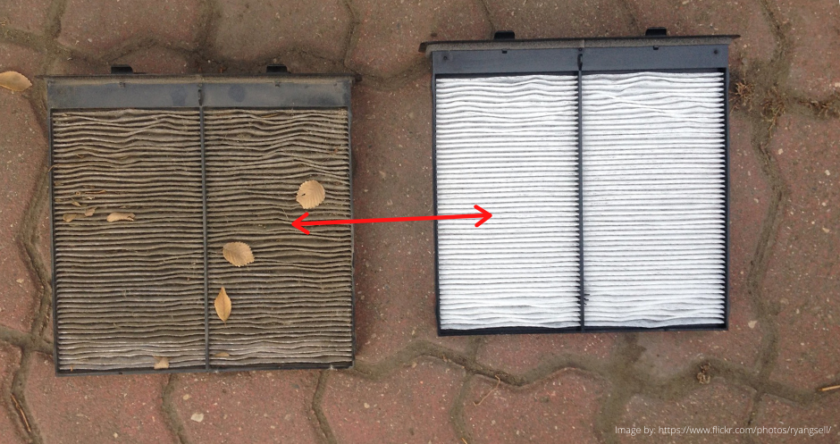
The air intake components are essential to keeping your engine running smoothly. There are a lot of air intake components, but only 3 can cause your car to feel sluggish when accelerating if clogged or damaged.
Air intake components that can affect acceleration include:
- Dirty air filter. A dirty air filter will lead to air restriction which can cause a rich air-fuel mixture, engine misfire, and a check engine light. This will most definitely make your car feel sluggish when accelerating.
- Faulty throttle body. Accumulation of carbon, road grime, and other materials interfering with opening and closing the throttle plate can cause a rich or lean air-fuel mixture, engine misfire, and the check engine light.
- Faulty gasket on the intake manifold or throttle body. A faulty gasket on the intake manifold or throttle body can cause a lean air-fuel mixture, engine misfire, and a check engine light.
2. Damaged Electrical Components
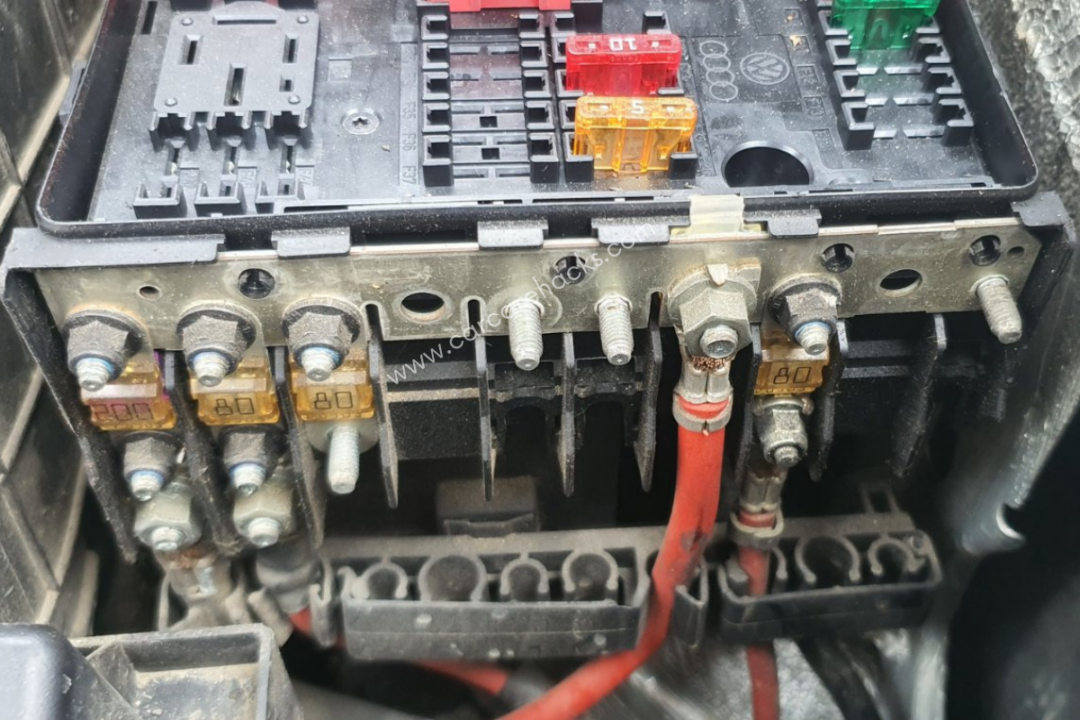
There are a lot of car components that are directly driven by electrical power. For example, the fuel pump. If there is a disruption in the electrical wiring connected to the fuel pump due to tear and wear, the fuel pump won’t operate correctly. This will lead to less fuel in the engine and therefore your car will most definitely feel sluggish when accelerating.
Signs of failed electrical components:
- Faulty alternator. A non-working alternator can affect multiple systems causing a lean air-fuel mixture, engine misfire, and a check engine light. If the air-to-fuel mixture ratio is disrupted, your car will lose power and will feel sluggish when accelerating.
- Faulty car battery. Your vehicle needs a properly running car battery in order for all of the electrically powered systems to work as they should. A faulty car battery might not be able to provide enough power for the fuel pump to work as it should and this will disrupt the fuel supply to the engine causing your car to feel sluggish when accelerating.
- Damaged wiring. A faulty ground wire or electrical connection to the alternator, battery, or engine control module can affect multiple systems causing a lean air-fuel mixture, engine misfire, and a check engine alternator or battery light. This will result in your car being sluggish when accelerating.
3. Faulty Components of the Emission System
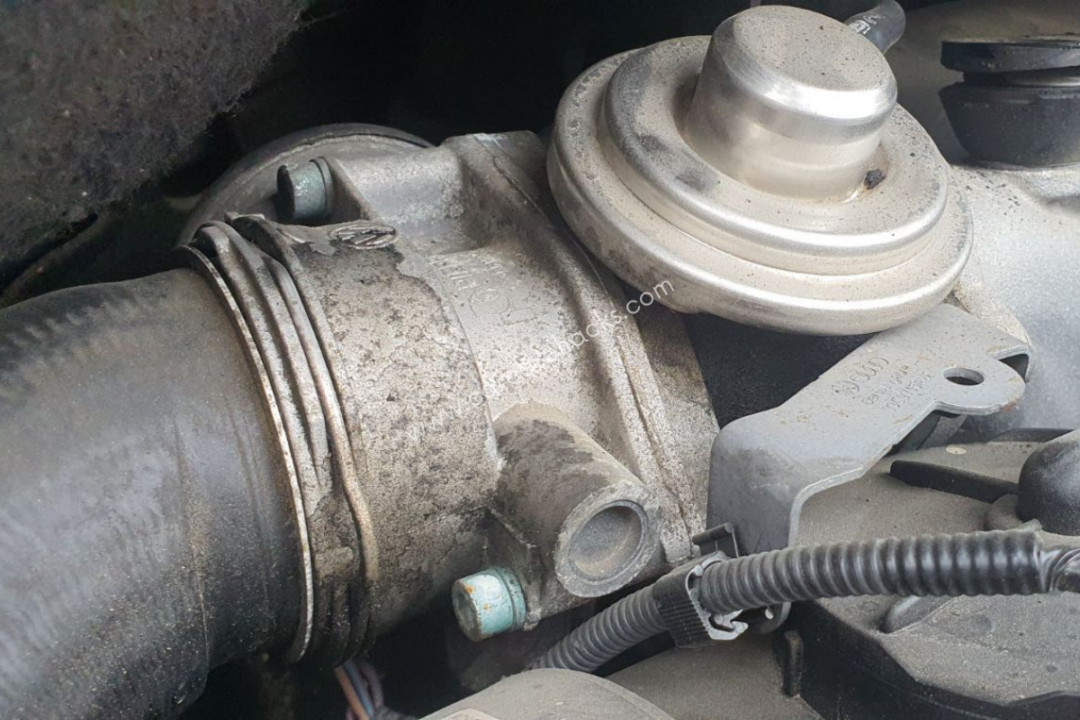
To be honest, I actually had this issue before. I had a faulty catalytic converter that ”choked” my car when I tried to accelerate. I thought it was something related to the engine just being old, but it turned out to be a bad catalytic converter.
Signs of a failed emission system components:
- A faulty catalytic converter. If your catalytic converter is faulty, it will cause blockage and restricted airflow which will result in a check engine light. Your car will feel sluggish when accelerating due to the fact that the engine is not getting enough air.
- Faulty exhaust gas recirculation valve. An exhaust gas recirculation valve also referred to as an EGR valve can stop working properly due to carbon buildup. There is a way to clean your EGR valve without removing it.
4. Engine Control Module Failure
The engine control module (ECM) can also be called the engine control unit (ECU) and is in charge of checking all of the vehicle’s sensors and making sure they are working properly.
Vehicles manufactured after the year 2000 have more and more sensors built into them. If some sensor goes bad like the mass airflow sensor will most definitely throw in a check engine light and will make your car feel sluggish when accelerating.
Signs of a failed engine control module:
- Faulty engine control module. If your engine control module goes bad, there will be nothing to monitor the sensors and make sure they work as they should. This will throw in a check engine light but can lead to some serious damage if not repaired on time.
- A faulty camshaft position sensor. The camshaft position sensor also referred to as a CMP sensor can cause an engine misfire and your vehicle will lose power on acceleration.
- Faulty crankshaft position sensor. The crankshaft position sensor also referred to as a CKP sensor can also cause an engine misfire and your vehicle won’t be operating as it should.
- A faulty engine coolant temperature sensor. The engine coolant temperature sensor also referred to as an ECT sensor can cause a rich or lean air to fuel mixture, engine misfire, and a check engine light if it becomes faulty.
- Bad intake air temperature sensor. The intake air temperature sensor also referred to as an IAT sensor can also cause rich or leaner air to fuel mixture and therefore disrupt the normal operation of the engine. Basically, anything that throws the engine out of balance will cause it to hesitate on acceleration.
- Bad knock sensor. Knock sensors detect high-frequency engine vibrations and transfer that data to the ECU. A vehicle can have one or two knock sensors depending on the number of cylinders. If one of the knock sensors goes bad, it won’t transfer any data to the ECU and an engine misfire can occur without being noticed.
- A bad manifold absolute pressure sensor. The manifold absolute pressure sensor also referred to as a MAP sensor can cause a disruption to the air-to-fuel mixture ratio and an engine misfire.
- A bad mass airflow sensor. The bad mass airflow sensor also referred to as a MAF sensor can get clogged or simply stop working. If your MAF sensor is not working, the amount of air going to the engine will not be properly measured and therefore the air-to-fuel ratio will be disrupted.
- Oxygen sensor. The oxygen sensor also referred to as an o2 sensor can also cause a rich or lean air to fuel mixture, engine misfire, and a check engine light.
- Malfunctioning throttle position sensor. The throttle position sensor also referred to as a TPS can become faulty by the accumulation of carbon, road grime, and other materials that can interfere with the opening and closing of the throttle plate. This condition will most definitely lead to engine misfire and will make your car feel sluggish when accelerating.
5. Faulty Fuel System Components
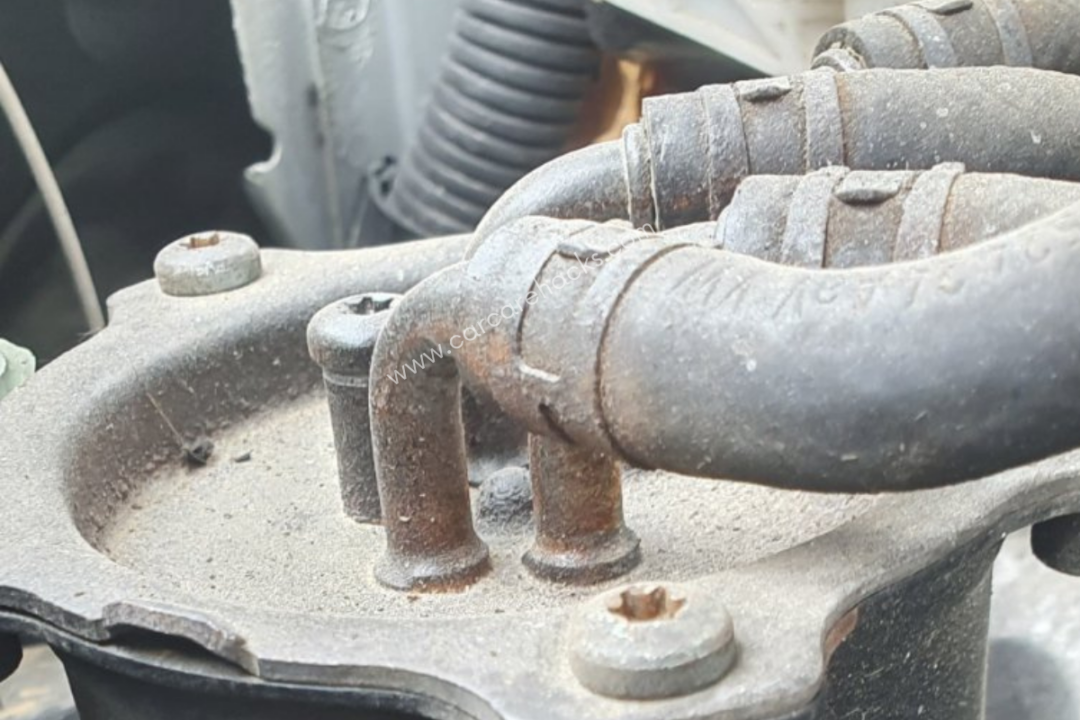
Having a properly operating fuel system is key to having a car that runs smoothly and doesn’t feel sluggish when accelerating. The fuel system has a lot of components. If one of these components fails, it can cause a disruption in the fuel flow.
Fuel system components that can affect acceleration include:
- Contaminated fuel. If your fuel is contaminated with water or has a high percentage of ethanol can cause the engine to misfire and your car will feel sluggish when accelerating.
- Faulty fuel line. The fuel lines can become crimped or flattened from other repairs or improper lifting and will result in not providing enough fuel to the engine causing a lean air-to-fuel mixture ratio.
- A faulty fuel filter. The fuel filters need to be regularly changed. If the fuel filter becomes dirty and clogged, it will not provide enough fuel to the engine causing a hesitation when accelerating.
- A faulty fuel injector. Fuel injectors can get dirty and clogged and develop internal mechanical or electrical issues. By providing less fuel to the engine causing a lean air-to-fuel mixture.
- Faulty fuel pressure regulator. A faulty fuel pressure regulator will not provide enough fuel to the engine. This will cause a lean air to fuel mixture, engine misfire, and a check engine light.
- Bad fuel pump. The fuel pumps are located inside the fuel tank. They have a mission to pump fuel from the fuel tank, through the fuel lines and fuel filter into the engine. A faulty fuel pump will not pump the required amount of fuel to the engine. Therefore, your car will feel sluggish when accelerating says Repair Smith.
6. Damaged Distributorless Ignition System (DIS)
DIS or the distributorless ignition system is a type of ignition system where the distributor of the electronic ignition is replaced with induction coils (one coil per cylinder).
Distributorless ignition system components that can affect acceleration include:
- A faulty ignition coil. A faulty ignition coil also referred to as a coil-on-plug, coil per cylinder, or coil near plug will not be able to provide enough voltage to the spark plug causing an engine to misfire.
- Faulty spark plug wire. Spark plug wires that are used on coil near plug ignition coils that are faulty can cause an engine to misfire and a check engine light.
7. A Faulty Distributor Ignition System
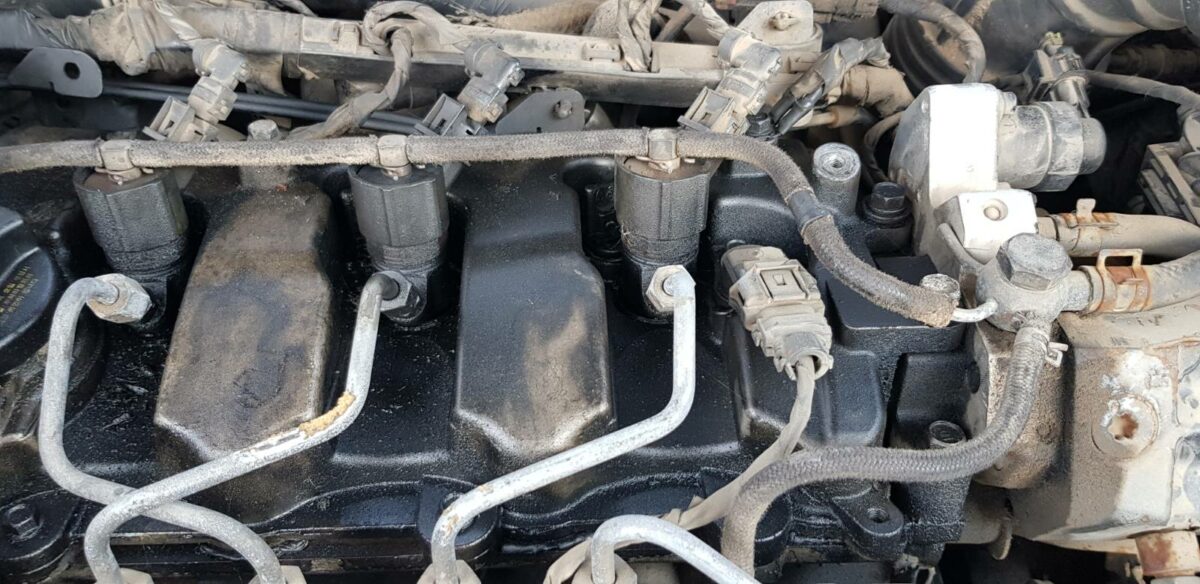
If your vehicle experiences problems with some of the distributor ignition system components, it can cause your car to feel sluggish when accelerating.
Distributor ignition system components that can affect acceleration include:
- Faulty ignition coil.
- A faulty ignition coil wire.
- A faulty distributor cap
- Bad rotor.
- Faulty breaker points.
- Bad condenser.
- Damaged spark plug wires.
8. Faulty Timing Systems
A timing chain or timing belt that has slipped. A timing chain or timing belt can slip or jump on the drive gears. This can occur because of wear and tear or simply because it has been incorrectly installed. This will lead to engine misfire and will cause your car to feel sluggish when accelerating.
Faulty variable valve timing solenoid. The variable valve timing solenoid also referred to as VVT can go bad by low or dirty engine oil causing engine misfire.
9. Broken Vacuum Hose
If a vacuum hose gets loosened, broken, disconnected, and starts leaking, it can lead to lean air to fuel mixture. The vacuum system has to be airtight. Any damage to any of the hoses can bring in more air to the engine and disrupt the air-to-fuel ratio.
How Do I Fix My Car From Struggling To Accelerate?
- Check and Replace the Air Filter: A clogged air filter can restrict airflow to the engine, affecting its performance. If it’s dirty, replace it with a new one.
- Inspect and Replace Spark Plugs: Faulty or worn-out spark plugs can cause poor acceleration. Inspect them for any signs of damage and replace them if necessary.
- Examine the Fuel Pump and Filter: A failing fuel pump or a clogged fuel filter can hinder fuel supply to the engine, leading to sluggish acceleration. Check these parts and replace them if needed.
- Check the Exhaust System: A blocked or damaged exhaust pipe or a faulty catalytic converter can reduce engine power. Have your exhaust system checked by a professional and repair or replace it as required.
- Inspect the Timing Belt: A worn-out timing belt can affect the engine’s timing, causing poor acceleration. If the belt is damaged or old, consider replacing it.
- Look at the Throttle Body: The throttle body controls the amount of air entering the engine. If it’s dirty or malfunctioning, it can affect acceleration. Clean or replace it if necessary.
- Check Oxygen Sensors and Mass Air Flow Sensor: These sensors play a crucial role in maintaining the right air-fuel mixture for combustion. If they’re malfunctioning, they can cause poor acceleration. Have them checked and replaced if needed.
What Will Happen If I Ignore Acceleration Issues?
Ignoring acceleration issues in your car can lead to increased fuel consumption as the engine struggles to perform efficiently.
Secondly, it may cause further damage to the engine or other parts of the vehicle, escalating repair costs in the long run.
If the issue is related to the fuel system or emissions, ignoring it could result in harmful pollutants being released into the environment, negatively impacting air quality.
Most critically, it could pose a safety risk. Sluggish acceleration can make it difficult to overtake or merge onto highways, potentially leading to dangerous driving situations.
FAQs
Q: What is a sluggish acceleration?
A: Sluggish acceleration refers to the slow or delayed response of a car when you press the accelerator pedal. It feels as if the car is not gaining speed quickly enough, and it may take longer to reach the desired speed.
Q: Can a clogged fuel filter cause the car to feel sluggish when accelerating?
A: Yes, a clogged fuel filter can restrict the flow of fuel to the engine, resulting in poor acceleration and a sluggish feeling when you try to accelerate. It is recommended to have the fuel filter replaced regularly as part of routine car maintenance.
Q: How does a dirty air filter affect acceleration?
A: A dirty air filter can restrict the amount of air that enters the engine, leading to a rich fuel-to-air mixture. This can negatively affect the combustion process and result in poor acceleration and a sluggish feeling when you try to accelerate.
Q: What role does the oxygen sensor play in acceleration?
A: The oxygen sensor monitors the amount of oxygen in the exhaust gases and helps ensure the proper air-to-fuel ratio for combustion. A faulty oxygen sensor can cause the engine control unit to provide an incorrect fuel supply, leading to poor acceleration and a sluggish feel.
Q: Can a bad spark plug cause sluggish acceleration?
A: Yes, a bad spark plug can cause misfires in the engine. This can result in poor combustion and a decrease in power. This can lead to sluggish acceleration and overall poor performance of the vehicle. It is important to replace spark plugs regularly to maintain optimal engine performance.
Q: What is the role of the throttle position sensor in acceleration?
A: The throttle position sensor (TPS) monitors the position of the throttle plate in the throttle body and provides this information to the engine control unit. A malfunctioning TPS can disrupt fuel delivery and cause delayed or inconsistent acceleration, leading to a sluggish feel when accelerating.
Q: How does a clogged catalytic converter affect acceleration?
A: A clogged catalytic converter restricts the flow of exhaust gases, which can hinder engine performance and lead to sluggish acceleration. This is often accompanied by other symptoms such as reduced power, increased fuel consumption, and the illumination of the check engine light.
Q: Can a problem with the fuel pump cause sluggish acceleration?
A: Yes, a faulty fuel pump can lead to inadequate fuel supply to the engine, resulting in poor acceleration and a sluggish feel when you try to accelerate. It is important to have the fuel pump checked and replaced if necessary to ensure proper engine performance.
Q: What should I do if my car feels sluggish when accelerating?
A: If your car feels sluggish when accelerating, it is recommended to have it inspected by a qualified mechanic. They can diagnose the underlying cause and perform the necessary repairs or maintenance to restore proper engine performance and alleviate sluggishness.
In Conclusion
When it comes to why your car may feel sluggish when accelerating, there are several different causes that can contribute to this issue.
Poor maintenance and build-up of dirt, debris, and sludge on the engine can all block exhaust flow or disrupt fuel delivery.
